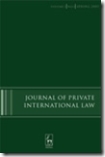New Conditions for Recognition of Judgements in France
On February 20, 2007, the French supreme court for private matters (Cour de cassation) held in Avianca that foreign judgements which had applied another law than the one that a French court would have applied could be recognised or enforced in France.
The case overrules a forty year old precedent, the famous Munzer decision, which had laid down the modern conditions for the enforcement and the recognition of judgements in France. In Munzer (1964), the Cour de cassation had ruled that five conditions, which were soon to be reduced to four (in the Bachir case in 1967), had to be fulfilled. First, the foreign court had to have jurisdiction from the French perspective. Second, the foreign court had to have applied the law that the French choice of law rule designated. Third, the foreign judgement should not be contrary to public policy. Fourth, the foreign judgement should not have been obtained for the sole purpose of avoiding the application of the applicable law (Fraude à la loi).
In Avianca, the Cour de cassation holds that there are now three conditions only for the recognition of foreign judgements, and that the application of the law designated by the French choice of law rule is not one anymore. The three conditions which remain unchanged are the jurisdiction of the foreign court, the compatibility with French public policy, and the absence of fraude à la loi.
The Cour de cassation does not give much details on the facts of case. I understand, and am happy to be corrected, that American companies (North American Air Service and Avianca) and Columbian companies (Avianca, Helicopteros Nacionales de Columbia and Aeronautico de Medellin Consolida) had sued a former director of one of the Columbian companies before a federal court in Washington D.C. On August 27, 1993, the U.S. Court ordered the former director to pay 3.9 millions dollars, plus interest. The former director moved to France, where the plaintiffs sought to enforce the judgement. The director argued against the enforcement because the U.S. Court had applied U.S. law to the issue of the liability of a director, when the French choice of law rule provides that the law of the company governs. The Cour de cassation rules that the law applied by the foreign court is irrelevant.
Avianca makes it clear that the new conditions are only relevant absent any treaty regulating the recognition of foreign judgements. European regulations and conventions are obviously such treaties.
The evolution had long been advocated by the majority of French writers. To many, it seemed weird to accept in principle the recognition of foreign judgements while making it a condition that they would have ruled exactly like a French court. Also, it seemed that the main purpose of the condition was to avoid fraude à la loi, which has always been a separate and autonomous condition.



 The first issue for 2007 of
The first issue for 2007 of 
